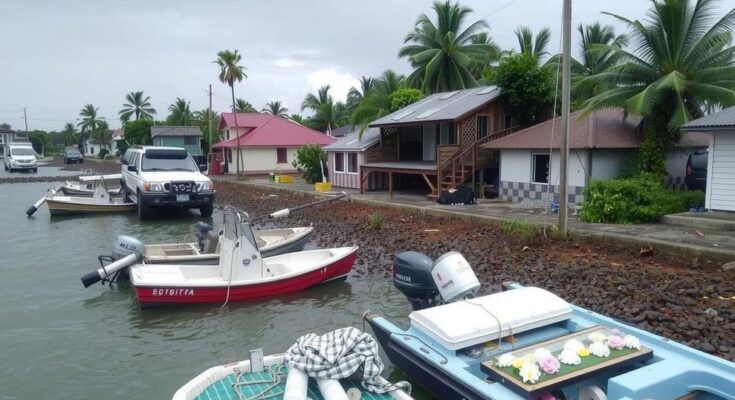Comoros declared a week of national mourning after Cyclone Chido caused widespread devastation in Mayotte, with authorities fearing hundreds of fatalities, especially in slum areas. The cyclone, a category four storm, resulted in severe infrastructure damage and a critical shortage of resources. French military and rescue teams are mobilizing to provide assistance to the affected areas, where humanitarian needs are escalating rapidly.
On Monday, Comoros declared a week of national mourning following the catastrophic impact of Cyclone Chido, which primarily affected the neighboring island of Mayotte. Authorities have expressed grave concerns over potential casualties, estimating that hundreds of individuals have perished, particularly among the vulnerable populations inhabiting informal settlements. President Azali Assoumani announced that the mourning period would extend until Sunday, recognizing the considerable loss of life and extensive damage to infrastructure across the islands.
Cyclone Chido, classified as a category four storm, was characterized by wind speeds exceeding 220 kilometers per hour, causing unprecedented destruction in Mayotte, which is only 70 kilometers away from Comoros. The island, which has a population of approximately 320,000, has a significant number of inhabitants from Comoros, many of whom reside in slums that have been severely impacted. Despite its official population, estimates suggest that undocumented immigrants may increase the actual number residing on the island to between 100,000 and 200,000.
Following the cyclone, which is the worst to strike Mayotte in nearly a century, French rescue teams and humanitarian aid have been dispatched via ships and military aircraft. Establishing access to affected regions has proved challenging, as damaged roads hindered relief efforts. Authorities are particularly worried about the loss of electricity and communication lines, leading to concerns regarding adequate supplies of drinking water. Reports indicate that the main hospital sustained heavy damage, and residents are beginning to face food shortages. Senator Salama Ramia provided an alarming update, stating, “Hunger is starting to rise. It is urgent that aid arrives, especially when you see children, babies, to whom we have nothing concrete to offer.”
As a region marked by substantial poverty, Mayotte is home to a predominantly Muslim population, many of whom live in precarious conditions. Mayotte has become a refuge for individuals from even poorer countries, such as Comoros and Somalia, complicating any rescue and recovery efforts due to the undocumented status of many residents. Local authorities anticipate challenges in accurately estimating the death toll due to rapid burial customs observed among Muslims. An official remarked that while the projected number of fatalities may reach into the thousands, it might be exceedingly difficult to account for all those affected as many are undocumented.
The tragedy in Comoros and Mayotte highlights the vulnerabilities faced by island nations, especially in the wake of natural disasters. Cyclone Chido exemplifies the risks posed by climate change and extreme weather events, which can devastate infrastructures and disproportionately affect poorer communities. The historical context of Mayotte’s relationship with Comoros adds complexity to the humanitarian crisis as many Comorans live and work there under precarious conditions. The aftermath of the cyclone stresses the need for efficient disaster response mechanisms and international humanitarian assistance.
In conclusion, the declaration of a week of national mourning in Comoros underscores the significant impact of Cyclone Chido on both Comoros and Mayotte. As rescue operations continue, the capacity to address immediate humanitarian needs and assess the long-term implications of the disaster will be crucial. Efforts will need to focus on providing necessary support to the affected populations, particularly those living in informal settlements, as they face immense challenges in the wake of this catastrophic event.
Original Source: www.arabnews.com




